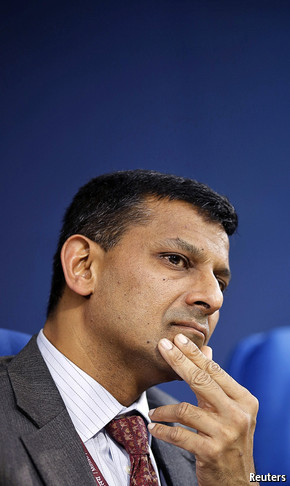I recall asking a graduate student, who was also from India and who was working on the doctoral thesis, a question, and the response was intriguing then as it continues to be even now--"oh, that is a macro question." As in macroeconomics.
If I as a reasonably curious and intelligent person could not understand what I thought was a simple issue, and if a soon-to-be-Ph.D. was not informed about it to explain to me, then there was something seriously wrong. It simply was not adding up well. It was one of those instances when economics seemed like mumbo-jumbo.
At least Ben Bernanke talks about the American and global macro-economy in ways that lesser mortals like me can at least pretend to know what it is going on. With Alan Greenspan, it was not even mumbo-jumbo, but gobbledygook! Which is all the more why economists like Paul Krugman and Joseph Stiglitz appeal to me and gazillion others--we are even able to disagree with them only because they talk and write in ways that we can understand. Recently, Krugman even commented on the need to clearly articulate ideas and arguments:
What every economist, and for that matter every writer on any subject, needs to realize is that unless you are a powerful person and people are looking for clues about what you’ll do next, nobody has to read what you write — and lecturing them about what they’re missing doesn’t help. You have to provide the hook, the pitch, whatever you want to call it, that pulls them in. It’s part of the job.Exactly! It is a damn challenging task, however, to write well. And even if well-written, macroeconomic issues ... well, consider the following, from an op-ed by Raghuram Rajan, in his new capacity as India's central banker:
An increase in gold imports placed further pressure on the current-account balance. Newly rich consumers in rural areas increasingly put their savings into gold, a familiar store of value, while wealthy urban consumers, worried about inflation, also turned to buying gold. Ironically, had they bought Apple shares, rather than a commodity (no matter how fungible, liquid, and investible it is), their purchases would have been treated as a foreign investment rather than as imports that add to the external deficit.I bet that the first half of that paragraph is easy to swallow. It just slides down without any effort. The rich and the poor alike, whether they live in cities or villages of India, view gold as a safe investment.
And then you reach his observation that the macroeconomic accounting of rupees and dollars changes if Indians had bought Apple shares instead of gold.
That's when I throw a flag and rule that economics is not a science. Economics is more like some version of a gentleman's agreement on how to think about something. There are many instances where it feels like they simply made up the rules as they went along. It is like questioning the offside rule in soccer or the ineligible receiver rule in American football. That is how it is and you don't ask questions.
I don't care if all my observations here are nothing but bullshit--this is my space for my opinions. That is how it is and you don't ask questions. :)


